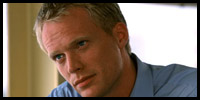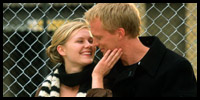
 |
|
Wimbledon (2004) Cast: Paul Bettany, Kirsten Dunst, Sam Neill, James McAvoy, Bernard Hill, Eleanor Bron, Jon Favreau, Austin Nichols, Alun Jones, John McEnroe, Chris Evert, Mary Carillo, John Barrett 2004 – 99 minutes Rated: Reviewed by Dustin Putman, September 15, 2004.  A sports movie and a romance, with all of the common cliches that go along with both genres, the one novelty—the only novelty—that "Wimbledon" holds is its choice of subject. In the annals of sports pictures, tennis may be one of the most uncommonly explored. In fact, has there ever been a film about the game of tennis? While director Richard Loncraine captures the championships at Wimbledon and the experiences of pro players with a certain accuracy, he unwisely chooses to concentrate on a shaggy love story that offers few romantic sparks.
A sports movie and a romance, with all of the common cliches that go along with both genres, the one novelty—the only novelty—that "Wimbledon" holds is its choice of subject. In the annals of sports pictures, tennis may be one of the most uncommonly explored. In fact, has there ever been a film about the game of tennis? While director Richard Loncraine captures the championships at Wimbledon and the experiences of pro players with a certain accuracy, he unwisely chooses to concentrate on a shaggy love story that offers few romantic sparks.
 Once ranked 11th in men's tennis, 32-year-old Peter Colt (Paul Bettany) has sunk to 119th in recent years with one disappointing match after the next. Returning to England's Wimbledon championships for one final try before planning to pack his career in, the public's expectations of Peter are understandably low. And then he meets go-getter novice Lizzie Bradbury (Kirsten Dunst), a fellow tennis pro competing in the women's division, and innocent flirting turns quickly to romance. For Peter, newfound love comes as his savior and he begins winning the matches. Lizzie is the exact opposite. With Peter on her mind, Lizzie's concentration is hindered, her chances of Wimbledon glory slipping through her fingers. But what is more important? Being with the person who is possibly the love of her life, or the sport she loves that she has worked so hard to master?
Once ranked 11th in men's tennis, 32-year-old Peter Colt (Paul Bettany) has sunk to 119th in recent years with one disappointing match after the next. Returning to England's Wimbledon championships for one final try before planning to pack his career in, the public's expectations of Peter are understandably low. And then he meets go-getter novice Lizzie Bradbury (Kirsten Dunst), a fellow tennis pro competing in the women's division, and innocent flirting turns quickly to romance. For Peter, newfound love comes as his savior and he begins winning the matches. Lizzie is the exact opposite. With Peter on her mind, Lizzie's concentration is hindered, her chances of Wimbledon glory slipping through her fingers. But what is more important? Being with the person who is possibly the love of her life, or the sport she loves that she has worked so hard to master?
 Billed as being from the producers of "Notting Hill" and "Bridget Jones's Diary," two snappy mainstream British comedies and effective love stories, "Wimbledon" pales in comparison. The comedy here, often courtesy of Peter's own barb-filled parents (Bernard Hill, Eleanor Bron) and slacker younger brother (James McAvoy), seems stale and predictable. As for the romance between Peter and Lizzie, it never becomes apparent what they find so attractive in each other aside from their shared sport. When complications inevitably arrive in the form of Lizzie's controlling father, Dennis (Sam Neill), and her own decision to leave Peter until after Wimbledon is finished, they are too obviously out of flimsy desperation to add interest to the story. Peter's overreaction to Lizzie's decision also makes him look like a needy, immature man-child, since Lizzie makes it clear that she simply needs to concentrate on her game for the championships and intends to return to him once they are over. The lack of any true stakes in their relationship, and the tendency to go for every possible cliche found in the romantic cinema handbook, don't help matters. And, for the record, was it really necessary to score a getting-to-know-each-other montage to the strings of David Gray's beautifully wistful "This Year's Love," when that very same song was used to much more powerful effect in 2004's "The Girl Next Door" and 2001's "crazy/beautiful" (also starring Kirsten Dunst)?
Billed as being from the producers of "Notting Hill" and "Bridget Jones's Diary," two snappy mainstream British comedies and effective love stories, "Wimbledon" pales in comparison. The comedy here, often courtesy of Peter's own barb-filled parents (Bernard Hill, Eleanor Bron) and slacker younger brother (James McAvoy), seems stale and predictable. As for the romance between Peter and Lizzie, it never becomes apparent what they find so attractive in each other aside from their shared sport. When complications inevitably arrive in the form of Lizzie's controlling father, Dennis (Sam Neill), and her own decision to leave Peter until after Wimbledon is finished, they are too obviously out of flimsy desperation to add interest to the story. Peter's overreaction to Lizzie's decision also makes him look like a needy, immature man-child, since Lizzie makes it clear that she simply needs to concentrate on her game for the championships and intends to return to him once they are over. The lack of any true stakes in their relationship, and the tendency to go for every possible cliche found in the romantic cinema handbook, don't help matters. And, for the record, was it really necessary to score a getting-to-know-each-other montage to the strings of David Gray's beautifully wistful "This Year's Love," when that very same song was used to much more powerful effect in 2004's "The Girl Next Door" and 2001's "crazy/beautiful" (also starring Kirsten Dunst)?
 At initial glance, Paul Bettany (2003's "Master and Commander: The Far Side of the World") and Kirsten Dunst (2004's "Spider-Man 2") would seem like an oddball pair to play romantic foils. Bettany is twelve years Dunst's senior, after all, but the age difference fortunately doesn't call attention to itself in the film. What they do lack, however, is much shared heat. For Dunst, this role of Lizzie Bradbury is not one that she will be remembered for down the road, as her character is underwritten and mostly just around to be the "love interest." What she and Bettany do achieve are tanned, sculpted bodies and a plausible trained technique that are dead ringers for real tennis pros. When they are out on the court, they avoid seeming like actors playing athletes. In supporting parts, Sam Neill (2001's "Jurassic Park III") adheres stalwartly to the hackneyed confines of his stock, strict father figure, and Jon Favreau (2003's "Something's Gotta Give") is wasted as Paul's business-minded ex-agent, Ron Roth, who comes knocking again when his client starts winning the matches.
At initial glance, Paul Bettany (2003's "Master and Commander: The Far Side of the World") and Kirsten Dunst (2004's "Spider-Man 2") would seem like an oddball pair to play romantic foils. Bettany is twelve years Dunst's senior, after all, but the age difference fortunately doesn't call attention to itself in the film. What they do lack, however, is much shared heat. For Dunst, this role of Lizzie Bradbury is not one that she will be remembered for down the road, as her character is underwritten and mostly just around to be the "love interest." What she and Bettany do achieve are tanned, sculpted bodies and a plausible trained technique that are dead ringers for real tennis pros. When they are out on the court, they avoid seeming like actors playing athletes. In supporting parts, Sam Neill (2001's "Jurassic Park III") adheres stalwartly to the hackneyed confines of his stock, strict father figure, and Jon Favreau (2003's "Something's Gotta Give") is wasted as Paul's business-minded ex-agent, Ron Roth, who comes knocking again when his client starts winning the matches.
 "Wimbledon" embodies mediocrity in that there is nothing found that is glaringly bad about it, but also nothing notably strong outside of peripheral technical credits. The opening credits, bouncing onto the screen with the sound effect of a tennis ball being hit by a racket, are more energetic that anything that follows, and there is some mild tension built during the finale set at the men's finals despite the outcome being a foregone conclusion. Otherwise, "Wimbledon" is strictly of the take-it-or-leave-it variety, not romantic or involving or memorable enough to warrant more than an ultra-brief passing glance. There may, indeed, be a great tennis movie lurking somewhere in the minds of Hollywood producers and screenwriters, but this isn't it.
"Wimbledon" embodies mediocrity in that there is nothing found that is glaringly bad about it, but also nothing notably strong outside of peripheral technical credits. The opening credits, bouncing onto the screen with the sound effect of a tennis ball being hit by a racket, are more energetic that anything that follows, and there is some mild tension built during the finale set at the men's finals despite the outcome being a foregone conclusion. Otherwise, "Wimbledon" is strictly of the take-it-or-leave-it variety, not romantic or involving or memorable enough to warrant more than an ultra-brief passing glance. There may, indeed, be a great tennis movie lurking somewhere in the minds of Hollywood producers and screenwriters, but this isn't it.
|
© 2004 by Dustin Putman |














